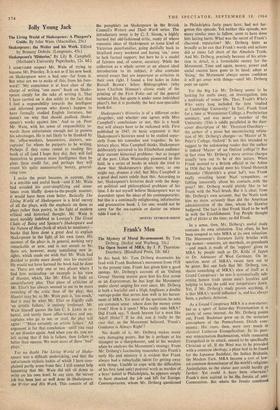Jolly Young Jack
The Living World of Shakespeare: A Playgoer's (Methuen's University Paperbacks, 12s. 6d.) I SOMETIMES suspect Mr. Wain of trying to become Mr. Priestley. It is not as if his new book on Shakespeare were a bad one—far from it. But what are we to make of this, from his fore- word? 'My conscience is at least clear of the charge of writing "one more" book on Shake- speare simply for the sake of writing it. That I have carried on is due solely to the fact that I feel a responsibility towards the intelligent and informed person who doesn't happen to have formally studied English literature, but doesn't see why that should padlock Shake- speare's works against him.' And so on. Poor Mr. Wain, with his sense of responsibility to- wards those unfortunate enough not to possess his advantages. He is not likely to be thanked by the 'office-workers, housewives, doctors, sea- captains' for whom he purports to be writing. Perhaps if they come round to reading this book at all (and I hope they do), they will feel themselves to possess more intelligence than he gives them credit for, and perhaps they will resent his quite unnecessarily breezy, general- ising tone.
I make the point because, in content, this is a sensible and useful book—and if Mr. Wain had avoided his over-simplifying and some- times even bluffly down-to-the-people manner, it would have been even better. Basically The Living World of Shakespeare is a brief survey of all the plays, with the emphasis on them as plays rather than poetry, in the light of modern critical and historical thought. Mr. Wain is most notably indebted to Lovejoy's The Great Chain of Being and Spencer's' Shakespeare and the Nature of Man (both of which he mentions)— books that have done a great deal to explain Shakespeare in the light of his own times. His account of the plays is, in general, nothing very remarkable or new, and is not meant to be; there are, however, many tantalising new in- sights, which made me wish that Mr. Wain had decided to probe more deeply into his material. He would not have harmed the book had he done so. There are only one or two places where I find him misleading—an example is his view of Hamlet, which, like Mr. Eliot, he finds an unsatisfactory play. That piece of criticism of Mr. Eliot's has always seemed to me to be more revealing of the critic than of the play; that Hamlet may be, as Mr. Wain puts it, 'too much,' that it may be what Mr. Eliot so frigidly calls
, 'an artistic failure,' is entirely irrelevant. Mr. Wain himself quotes the late C. S. Lewis in re- buttal, and surely those office-workers and sea-
captains who go to see, or read, the play will agree : "Most certainly an artistic failure." All argument is for that conclusion—until you read or see Hamlet again. And when you do, you are left saying that if this is failure, then failure is better than success. We want more of these "bad" plays.'
I've no doubt The Living World of Shake- speare was a difficult undertaking, and that the unfortunate stylistic habits of which I have com- plained partly arose from this; I still cannot help lamenting that Mr. Wain did not sit down to write on his own level. In any case, the survey job has been just as well done in Shakespeare, the Writer and His Work. This consists of all the pamphlets on Shakespeare in the British Council's Writers and Their Work series. The introductory essay is .by C. J. Sisson, a highly learned but old-fashioned critic, many of whose romantic ideas of Shakespeare as some kind of Victorian paterfamilias, going dutifully back to Stratford every weekend and hating 'sin,' seem to lack factual support; but here he is a model of fairness and, of course, accuracy. While the collection as a whole serves as an almost ideal introduction to its subject, it also contains several essays that are important as criticism in their own right. I found a few holes in John Russell Brown's Select Bibliographies (why leave Charlton Hinman's classic study of the printing of the First Folio out of the general technical list, but quote it under some individual plays?), but it is probably the best non-specialist book-list.
Shakespeare's Histories is of a different order altogether, and whether one agrees with Miss Campbell's conclusions or not, this is a book that will always have to be reckoned with. First published in 1947, its basic argument is that Shakespeare's histories need to be studied separ- ately from his comedies and tragedies. In his history plays, Miss Campbell thinks, Shakespeare deliberately mirrored to his Elizabethan audience their current historical problems—but as images of the past. Lilian Winstanley pioneered in this field, in a series of books in which she tried to show that Shakespeare's plays were, as one might say, drames d clef; but Miss Campbell is a good deal more subtle than this. According to her, Shakespeare's histories dealt with the deep- est political and philosophical problems of his time. I do not myself believe Shakespeare was so dependent upon the ideas of his contemporaries; but this is a continually enlightening, inforinative and provocative book. I, for one, would not be sorry for the sea-captain or doctor on whose table I saw it.
MARTIN SEYMOUR-SMITH


































 Previous page
Previous page